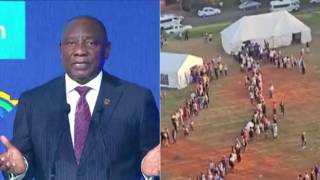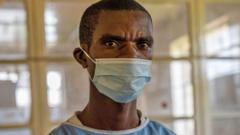
We go to South Africa for an update on how the African National Congress, the party once led by Nelson Mandela, has lost its governing majority for the first time since the end of apartheid in South Africa. The ANC, led by President Cyril Ramaphosa, remains the largest party in the National Assembly. It got just 40% of the vote in last week’s election and won 159 seats in the 400-seat parliament. The liberal Democratic Alliance is the largest opposition party with 87 seats, but the biggest gains were made by the new uMkhonto we Sizwe (MK) party led by former President Jacob Zuma, who left the ANC under investigation for corruption. South African activist Trevor Ngwane, chair of the United Front, a coalition of community and labor groups, says a “crisis of everyday life” all but guaranteed the ANC’s setback as the country grapples with high unemployment, corruption, crumbling infrastructure and social services, and deepening inequality. “The ANC failed to fulfill the promises of national liberation. It fell too short of the expectations of the masses, of the working class and the poor,” says Ngwane. We also speak with journalist Louis Freedberg, who says the majority of the population of South Africa is under 30 and sees little hope for the future. “They’ve lost faith in government, and they actually don’t believe that anything will get better,” he says. The ANC must now decide how to build a coalition government for the first time.

 5 months ago
17
5 months ago
17

